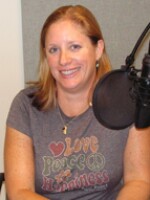A couple of weeks ago, Gloria Delany-Barmann and I returned from a short trip to Puerto Rico. We went to check up on our colleagues we've been working with the last couple of years and to take a few supplies and funds so generously donated by members of our community to those in need. And yes, just in case you were wondering, it is possible to take a chainsaw as part of your checked baggage.
I’ve worked in several disaster zones over the years – in Louisiana and Texas after hurricanes Katrina and Rita, and in Illinois along the Mississippi River after the monumental flooding of 2008. But I have never seen devastation like what Puerto Rico is facing. Some five weeks after Hurricane María passed over the island the environmental damage was still profound, but nature was beginning to heal. Our friends who lived through the event said that they could see the changes, as the forests begin to regenerate and mountains return to a more recognizable state of lush green.
That being said, as I write this commentary it is taking humans much longer to mend, as nearly seven weeks after the hurricane more than 50% of the power grid is still offline. This reminds us that disasters are not just environmental but also social events. It is clear to me that much of what is hindering the recovery on the island has less to do with logistics and “know how” and more to do with the socio-economic and cultural standing of Puerto Ricans in the United States.
The lessons learned from observing how communities recover, restructure, and move forward after natural disasters can also be applied to the state-imposed disaster that WIU weathered last year.
Anthropologists who study disasters know that in the immediate stages before and after a disaster, people must work together to protect their community. Sometimes this means safeguarding vital pieces of infrastructure like water treatment plants or levees. In the case of Hurricane María, WIU Anthropology alum, Sara Vasquez told us how her extended family worked together to “tie their houses down” so that they would not lose them to the 200+mph winds they would endure for over 24 hours. In this phase, people shared knowledge and worked together – not against each other. They sacrificed time, energy, and monies they could have spent individually for the overall good of the community.

Last year WIU went without a budget. Our unionized faculty voted to take a pay cut of three percent for the good of the institution, working together much like an extended family. The administration decided to contribute differently. Rather than sharing the sacrifice equally with faculty, administration took furlough days. And while helpful, this is not the same as a pay cut. Add to this the elimination of several majors that emphasize critical thinking and problem solving skills - which are valuable and marketable for any profession - and from the very beginning of WIU’s state imposed disaster, our institution seemed more like a dysfunctional family, in which parents favor one sibling over the other, rather than a family that recognizes the importance and contributions of all its members.
From Sara’s kitchen window, the view used to be a wall of solid green. Now you can look across the mountain ridge and see Sara’s grandfather’s house. Many would only notice the destruction, but Sara thinks about things differently. She said, “Nature has given us a clean slate. We lost all our crops, but now we can practice agroforestry like we want to. We don’t have to worry about which trees to take down, because María did that for us. This is our reality and we will make it a better place for everyone.”
The view out of my office window has also changed. Our campus has fewer students and faculty than in the past, meaning that our reality is different than before. But those who have remained are committed to making WIU a place where new students and new faculty choose to come. Resilient people and institutions quickly assess difficult situations, keep calm, and evaluate things rationally so that they can formulate sustainable and equitable plans for the future. My hope is that just as WIU took that leap of faith to invest in our students by providing them MAP funding when the state of Illinois would not, so too will they see the value in investing in the current and future faculty. This means deciding not to be the only public state university to ask their faculty to continue to take a cut in pay or to discount the future contributions of current and new faculty by casting aside the salary minima that brought many of us, myself included, to WIU in the first place.
Being able to think differently is a basic definition of innovation and it is also the way in which to build a future that holds promise for everyone. As Francis of Assisi wrote, “Start by doing what’s necessary; then do what’s possible; and suddenly you are doing the impossible.”
Heather McIlvaine-Newsad is a Professor of Anthropology at Western Illinois University.
The opinions expressed are not necessarily those of the university or Tri States Public Radio. Diverse viewpoints are welcomed and encouraged.





